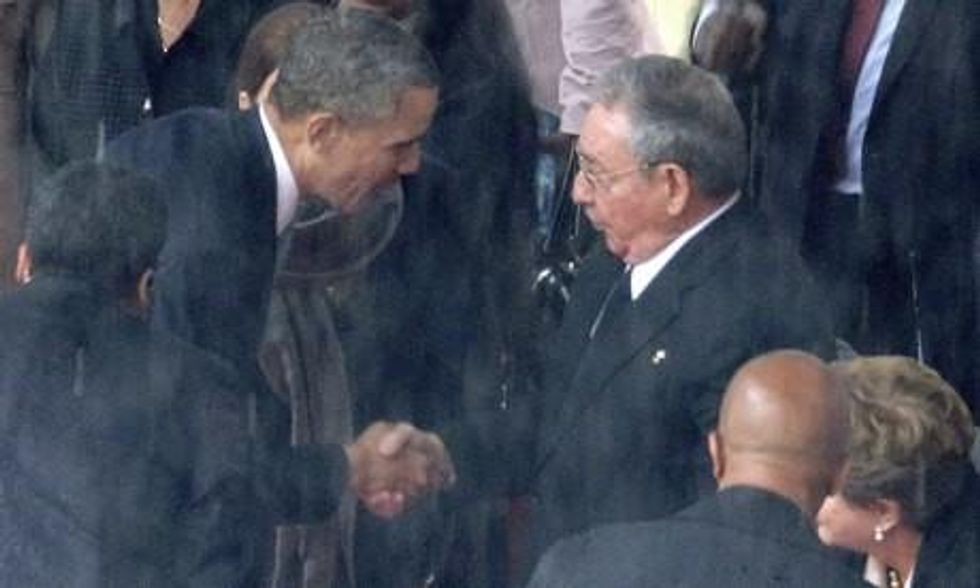This sodden picture has a rough ungainliness that makes it feel far from contrived, yet surely Obama must have considered his action carefully. After decades of chill that once brought the world close to war, an American president shakes hands in this already-historic photograph with Raul Castro, president of Cuba.
Shaking hands is the modern world's most potent public gesture, a symbolic acknowledgement of mutural respect. It is democratic because it is a linking of individuals on equal terms. Bowing to monarchs and doffing caps belong to earlier ages that believed in hierarchies. The handshake is the visual language of a world that at least aspires to be egalitarian. It also has the advantage that it retains the formality of yesteryear. It's not like kissing someone in public, or embracing. No close bodily contact is made. It is just two hands briefly joined - which makes the handshake a perfect visual expression of rapprochement between old foes who may still not trust each other as far as a springbok can jump.
Obama showed in his speech how deeply he admires and how much he has thought about Mandela (even if his posing for a selfie later with David Cameron and the Danish prime minister Helle Thorning-Schmidt somewhat undermined the gravitas). So it is not fanciful to wonder if his unexpected handshake across history's dividing lines is a very precise homage to his hero. Mandela's life has come to stand for the kind of imaginative, generous defiance of apparent bitter destinies so beautifully summed up by that public handshake between the American and Cuban leaders. Yet there is more to it - for handshakes were one of Nelson Mandela's simplest ways of breaking down divisions.
In May 1990, just three months after he was released from his 27-year prison sentence for fighting apartheid, Mandela was photographed shaking hands with apartheid's last president, FW de Klerk. They'd just signed the agreement that would lead to apartheid's end. Mandela - as Obama pointed out in his speech - was no inhuman saint, no spiritual ascetic, and yet this fighter preached peace better than all the world's religions. Again and again, he crossed planets with a handshake. Such an easy natural gesture. Picture after picture shows him shaking hands with his former jailers.
Obama may have been deliberately recreating one of Mandela's own most useful gestures in his moment of human contact with the president of Cuba. In the picture, as he leans down towards an apparently surprised Castro, he comes across as he did in his speech as the only world leader capable of stepping up to an occassion whose historic weight he himself eruditely assessed - comparing Mandela rightly not only with Gandhi and Martin Luther King but also with Abraham Lincoln and America's Founding Fathers.
The America civil war in which Lincoln upheld the union and human rights ended when the two opposing generals, Ulysses S Grant and Robert E Lee, shook hands in Appomattox court house, Virginia on Palm Sunday 1865. Can the handshake at the FNB stadium end the freeze between America and Cuba that is one of the last legacies of the Cold War?
It would be a fitting memorial for Nelson Mandela - or at least the start of one. His legacy has to be more than words. Piety is not enough. Nor is it good enough for old veterans of the anti-apartheid movement to endlessly prod at the injustice of rightwingers joining in adulation of Mandela. He really was the kind of leader who only comes once in a millennium and in former ages, a religion would probably have been built around him. A world worthy of Mandela is something to hope for. A handshake is a good place to start.
